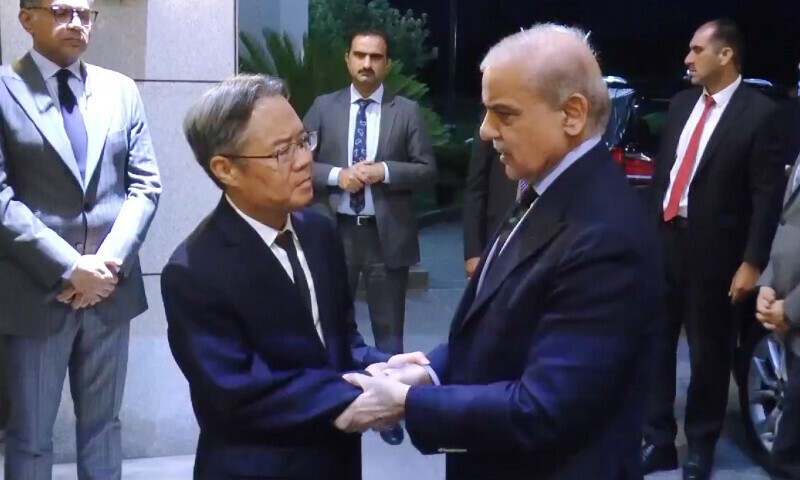
A public spat between Deputy Prime Minister of Pakistan Ishaq Dar and Chinese ambassador in Islamabad Jiang Zaidong over attacks on Chinese citizens in Pakistan has not only put the all-weather friendship between China and Pakistan under severe stress but also raised doubts about the future of the China Pakistan Economic Corridor.
The spat took place in the last week of October when, speaking at a seminar in Islamabad organized by the Pakistan-China Institute, Deputy Prime Minister of Pakistan Ishaq Dar bent over backwards to please the Chinese envoy Pakistan Jiang Zaidong who was also present in the event. Dar declared that Pakistan was the only country to which China would send its nationals even in the face of security concerns. “The Chinese are very clear. No matter how lucrative an opportunity for investment is, if there is a security issue they do not send Chinese personnel. Your country (Pakistan) is the only exception,” Dar was reported to have said.
The Chinese envoy immediately stood up and contradicted Dar. “The security of Chinese citizens is paramount for President Xi,” he said. The envoy also warned that the violence targeting Chinese nationals was causing Beijing to rethink its investments in Pakistan under the BRI. He also emphasized on the need for Islamabad to take measures to prevent the recurrence of such attacks.
Islamabad did not, however, take the riposte of the Chinese envoy lying down. In an unprecedented formal response, a Pakistani Foreign Office spokesperson has subsequently described the statement of the Chinese ambassador as “perplexing” and a marked departure from the long-standing diplomatic norms governing bilateral ties between the two countries.
Beijing is upset about the death of seven Chinese nationals in Pakistan in suicide attacks since March this year. At least 23 Chinese nationals have been killed in Pakistan since 2018, after the launch of the China Pakistan Economic Corridor in 2015.
But the Pakistani people do not appear to be paying heed to the ire of the Chinese envoy. In a subsequent incident in the first week of November, two Chinese nationals were injured, one of them critically, when a security guard at the Industrial Trading Estate area of Karachi opened fire at them.
Within two days of the incident of firing, Interior Minister of Pakistan Mohsin Naqvi called on the Chinese ambassador Jiang Zaidong, expressed regret for the Karachi incident, and assured him that ensuring the safety of Chinese citizens was the topmost priority of the Pakistani government. The two together then agreed to devise a joint strategy to prevent the recurrence of such incidents.
Common Pakistani people are apprehensive over the exponential increase in the migration of Chinese nationals to Pakistan to work in Belt and Road Initiative projects and upset about the way the Chinese people treat common Pakistanis as inferiors. The majority of the attacks on Chinese nationals in Pakistan have taken place in Balochistan. Baloch people fear that by 2048 the local population in the Pakistani province will be outnumbered by Han immigrants, giving rise to a situation similar to that faced by the Uighur people in Xinjiang.
Under the Port Park City model, the development of the Gwadar Port City in Balochistan incorporates the construction of a China-funded industrial park with amenities like hospitals, schools, university, airport and a golf resort on a nearby free trade zone spread over an area of 2,281 acres. Being constructed at an estimated cost of $150-million, the ‘proxy colony’ with a security gate is expected to exclusively house 500,000 Chinese Han nationals, who will come to work in the area. The ongoing work under the PPC model has already dislocated many natives and fishermen from the port city, leading to protests in the Balochistan province. About 10,000 Chinese nationals are estimated to be living in Islamabad now and another 35,000 in other parts of Pakistan.
Several ‘safe city projects’ have been launched in Pakistan for the protection of Chinese nationals. CCTV cameras, scanners and GPS have been installed. Most of these technologies are being implemented by Chinese state-owned enterprises. In 2016, the Islamabad Safe City Project, with a facial recognition and vehicle management system in place, was completed. In 2019, a surveillance system was installed at the University of Balochistan, often leading to harassment of students. The Lahore Safe City Project includes facial recognition, integrated communication platforms, multiple tracking operations and automated vehicle number plate recognition. Through these safe city projects, China has “installed much of the Xinjiang digital security system across numerous Pakistani cities, including Islamabad, Peshawar, Lahore, Quetta, Karachi and Gwadar,” says an Observer Research Foundation study.
The growing Chinese influence has increased anti-state sentiments among the people of Balochistan. With the rampant exploitation of resources of Balochistan through CPEC projects and promises of jobs not materialising, the Baloch people have been pushed to the margins of the economy. The Baloch Liberation Army has blamed Beijing for exploitation and accused China and Pakistan of being “partners in crime.”
The ORF study has found that on an average about 89 percent of all contracts for BRI projects in different countries have gone to Chinese construction companies, 7.6 percent to locals, and 3.7 percent to other foreign companies. In countries such as Pakistan, Tajikistan and Kyrgyzstan, China has also established markets for its IT and telecom technologies which have political and geostrategic implications. Through these technologies, Beijing has tried to export surveillance and impose censorship, and gained access to sensitive information and data. Several private security establishments have been set up in these countries to protect Chinese BRI investments. Most of these are either run by serving or former personnel of the Ministry of Public Security of China.







